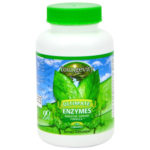Could low Hydrochloric Acid (stomach acid) be the cause of your illness? Or have you been told that you have too much stomach acid? There is almost a sense that stomach acid is somehow a bad thing.
This short article will explain more about stomach acid and give you a simple test to try at home.
Many people don’t digest their food because of low acid in the stomach; many things may cause this, but generally age is a huge factor. At least 50% of people in their 60’s and even more in later years suffer from low acid.
Drinking clear liquids with meals interrupts the “fire” of digestion, too, so Super Sized drinks could be a culprit we can do something about.
Low HCL may be a root cause of celiac disease and a variety of skin disorders. Here are some signs:
- Burping, gas and acid reflux
- Weak and sagging muscles
- Asthma due to mucous buildup
- Repeated bacterial infections
- Excess waste causing repeated kidney infections
- Endocrine glands (thyroid, adrenals, pancreas, ovaries, etc) not functioning at a proper level.
- Toxic liver that can also lead to high blood pressure
- Low potassium which can cause irregular heartbeat
- Abscesses, boils, and pus due to chlorine deficiency which is part of the HCL molecule
- Carbon dioxide imbalance which could be present in epilepsy or any brain issues
- Mineral imbalances: calcium, magnesium, and sodium
With all of these symptoms, you would think that it would be regularly diagnosed, but it is almost always overlooked by traditional medical exams.
Hypochlorhydria or low stomach acid, is a commonly ignored problem. If you get nausea, acid reflux, heartburn, burping, gas or bloating after eating, then you probably have a low stomach acid issue.
People with gastrointestinal issues such as Celiac Disease or IBS are more likely to have stomach acid problems. If you’ve made dietary changes and you are still not seeing results, low stomach acid might be holding you back.
Why do you need stomach acid?
- Stomach acid kills bacteria and other bugs that enter the body. It also prevents intestinal bacteria from migrating colonizing the stomach. Stomach acid supports your immune system.
- The right stomach acid is needed to adequately absorb many minerals (iron, copper, zinc and calcium), vitamin B12, folic acid and proteins.
- Stomach acid tells the pancreas to start secreting digestive juices to break down food.
What are some major indicators of low stomach acid?
1. Eating meat makes you feel bad.
Without enough stomach acid… red, white or any kind… meat will probably make you feel worse than when you eat other types of foods that contain less protein.
You can try to take an HCL tablet (see below) in the middle of a meal including a roast or steak. If you feel normal, you probably have low stomach acid, but if you notice a burning after the meal, you probably have adequate acids.
2. Do you get acid reflux after eating?
We have been brainwashed by the media and drug companies to believe that GERD or reflux is due to high stomach acid. But low stomach acid leads to an increase in abdominal pressure that pushes up against the sphincter in the esophagus (your throat). When the pressure opens this sphincter and even a tiny amount of acid touches the lining of your throat , it will burn like crazy because the esophagus doesn’t have a lining to protect it like the stomach does.
(The sphincter muscle is like a little door that opens and closes between your throat/esophagus and your stomach)
With reflux, you have stomach acid reaching unprotected parts of the esophagus and burning the lining. If you take an anti-acid, the pain will subside so we naturally assume that having too much acid causes the problem! But the anti-acid has helped by soothing the esophagus. You need acid in your stomach; just not in your throat!
3. Do you get gas or burp after you eat?
Such as:
- Several burps shortly after finishing or bad tasting burps?
- Get gas 1-2 hours after eating?
- Bloated after eating that lasts for a few hours?
- Feel like your food isn’t going anywhere and is just sitting there?
It is possible that the bacteria surviving in your gut are eating the fermenting food…the gas is a result of their meal…ugh. So if you have bacteria overgrowth in the stomach or small intestines, food you ate is being fermented by bacteria and the byproduct of their feast is gas.
Baking soda test for low stomach acid
Here is a simple test that you can do at home to check whether you have low stomach acid:
- Mix 1/4 teaspoon of baking soda in 4-6 ounces of cold water first thing in the morning before eating or drinking anything.
- Drink the baking soda solution.
- Time how long it takes you to belch. Time up to five minutes.
Belch within five minutes? You may have low stomach acid but not too low.
Belch within 10 minutes? You have low acid and need to supplement when eating protein.
Belch after 15 minutes, or NEVER? You definitely have low stomach acid and must supplement if you eat meat.
Which Supplement?
 If you decide to try HCL and other enzyme supplements for low stomach acid, then try Ultimate Enzymes from Youngevity. Click here and take a look. You can Shop or Join. if you Join then you save 30%.
If you decide to try HCL and other enzyme supplements for low stomach acid, then try Ultimate Enzymes from Youngevity. Click here and take a look. You can Shop or Join. if you Join then you save 30%.
Ultimate Enzymes® is designed to support your digestion. The Betaine HCL and other enzymes help your digestive system break down carbohydrates proteins and fats, which makes it easier to absorb the nutrients.
Betty Sue is not giving medical advice so seek the advice of your healthcare professional, especially if you are pregnant.
Betty Sue’s smoothie book is unlike any other; instead of fruit filled smoothies that feed cancer, viruses and fungus, these smoothies are categorized by body system. If you have problems with elimination, the author offers smoothies that help with that. Should you have cancer, there are smoothies appropriate for those of us with cancer. Included are smoothies for children and smoothies for respiratory issues. Click here to buy from Amazon.


